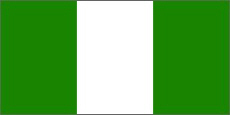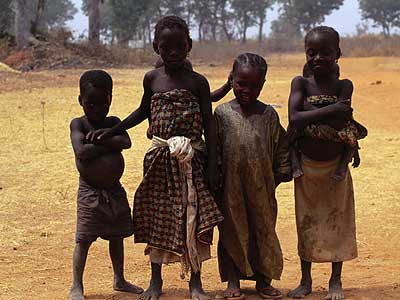| |


Nigeria gained independence from
Britain in 1960 and from 1966 to 1999 was controlled for the most
part by different military governments. In May 1999, the
democratically elected government of Olusegun Obasanjo, a former
military dictator, assumed power. He was re-elected to a second term
in 2003.
Nigeria has a population of around
131 million and life expectancy is around 50 years. It is an
ethnically and religiously complex country with over 250 ethnic
groups. More than 50% of the population belong to the Hausa-Fulani,
Yoruba and Ibo ethnic groups.
Nigeria has the biggest population
in Africa with 1 in 6 Africans being Nigerian. Although HIV
prevalence rates are much lower in Nigeria than in other African
countries such as South Africa and Zambia, the size of Nigeria's
population meant that by the end of 2003, there were an estimated
3,600,000 people living with HIV/AIDS. This is the largest number in
the world after South Africa and India.
Factors
contributing to the spread of HIV in Nigeria
Lack
of sexual health information and education
Sex is traditionally a very private
subject in Nigeria for cultural and religious reasons. The
discussion of sex with teenagers, girls in particular, is seen as
indecent. Up until recently there was little or no sexual health
education for young people and this has been a major barrier to
reducing sexually transmitted infection (STI) and HIV rates. Lack of
accurate information about sexual health has meant there are many
myths and misconceptions about sex and HIV, contributing to
increasing transmission rates as well as stigma and discrimination
towards people living with HIV/AIDS.
Stigma
and discrimination
Stigma and discrimination against
people living with HIV/AIDS is commonplace in Nigeria. Both
Christians and Muslims see immoral behaviour as being the cause of
the HIV/AIDS epidemic. This affects attitudes towards people living
with HIV/AIDS (PLWHA) and HIV prevention. PLWHA often lose their
jobs or are denied healthcare services because of the ignorance and
fear about HIV and AIDS. There is so much ignorance about HIV/AIDS
that 60% of healthcare workers think HIV positive patients should be
isolated from other patients.
Poor
Health Services
Over the last two decades, Nigeria's
healthcare care system has deteriorated because of political
instability, corruption and a mismanaged economy. Large parts of the
country lack even basic healthcare provision, making it difficult to
establish HIV testing and prevention services such as those for the
prevention of mother-to-child transmission (MTCT). Sexual health
clinics providing contraception and testing and treatment for other
STIs are also few and far between

Full country name: Federal Republic of Nigeria
Area: 924 000 sq. km. (356 700 sq. mi.)
Population: 131,859,731
People: Nigerian
Language: English (official), Hausa, Igbo, Yoruba, others.
Religion: Muslim 50%, Christian 40%, indigenous beliefs 10%
Government: federal republic
Head of State: President Olusegun OBASANJO
Climate: Temperatures 22-36°C, annual rainfall ranges from 381 cm. along the coast to 64 cm. or less in the far north.
Major Industries: Crude oil, coal, tin, columbite, palm oil, peanuts, cotton, rubber, wood, hides and skins, textiles, cement and other construction materials, food products, footwear, chemicals, fertilizer, printing, ceramics, steel.
Imports partners: USA 15.6%, UK 9.6%, Germany 7.3%, China 7.2%, Italy 4.3% (2003)
Currency: Naira (NGN)
|
|

